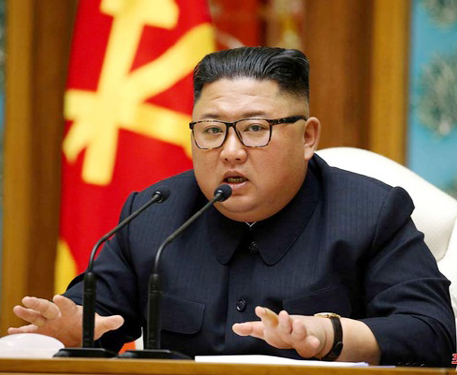
The New York Times :
Battered by international sanctions, a global pandemic and flood damage, North Korea on Thursday admitted for the first time that it had failed to achieve the economic goals of its leader, Kim Jong Un.
To chart a new course for its economy, the North plans to hold a rare ruling Workers’ Party congress in January, the state news media reported.
At the last party congress in 2016, which was the first such meeting in 36 years, Kim had adopted an ambitious five-year economic plan to build what he called a “powerful socialist country.” The plan was for Kim to celebrate his achievement during the party’s 75th anniversary on Oct 10 this year with pomp and spectacle.
But things have hardly transpired as Kim had hoped.
North Korea had already been struggling under the stranglehold of United Nations sanctions. Then, last week, the North Korean leader admitted that his nation was also facing “two crises at the same time”: fighting the spread of the coronavirus and coping with extensive flood damage. But he ordered his country not to accept any international aid for fear that outside help might bring in COVID-19.
Those triple punches prompted the no-nonsense assessment by Kim during a party meeting Wednesday, an unprecedented admission by the isolated country that its economic plans had faltered.
Plans to improve the national economy have been significantly delayed by “severe internal and external situations and unexpected manifold challenges,” the Central Committee of the Workers’ Party said during the meeting in Pyongyang, the capital. It also noted that people’s living standard had “not been improved remarkably.”
The committee decided to convene the new party congress, North Korea’s biggest political decision-making event, in January to set forth “strategic and tactical policies,” the North’s official Korean Central News Agency reported Thursday.
When Kim took power after the death in 2011 of his father and predecessor, Kim Jong Il, he vowed to ensure that his people, long suffering from multiple maladies, would “never have to tighten their belt again.” In 2016, when he adopted his economic plan, the North’s economy grew 3.9%, the highest since a devastating famine hit the country in the late 1990s, according to estimates by the South’s central Bank of Korea.
Battered by international sanctions, a global pandemic and flood damage, North Korea on Thursday admitted for the first time that it had failed to achieve the economic goals of its leader, Kim Jong Un.
To chart a new course for its economy, the North plans to hold a rare ruling Workers’ Party congress in January, the state news media reported.
At the last party congress in 2016, which was the first such meeting in 36 years, Kim had adopted an ambitious five-year economic plan to build what he called a “powerful socialist country.” The plan was for Kim to celebrate his achievement during the party’s 75th anniversary on Oct 10 this year with pomp and spectacle.
But things have hardly transpired as Kim had hoped.
North Korea had already been struggling under the stranglehold of United Nations sanctions. Then, last week, the North Korean leader admitted that his nation was also facing “two crises at the same time”: fighting the spread of the coronavirus and coping with extensive flood damage. But he ordered his country not to accept any international aid for fear that outside help might bring in COVID-19.
Those triple punches prompted the no-nonsense assessment by Kim during a party meeting Wednesday, an unprecedented admission by the isolated country that its economic plans had faltered.
Plans to improve the national economy have been significantly delayed by “severe internal and external situations and unexpected manifold challenges,” the Central Committee of the Workers’ Party said during the meeting in Pyongyang, the capital. It also noted that people’s living standard had “not been improved remarkably.”
The committee decided to convene the new party congress, North Korea’s biggest political decision-making event, in January to set forth “strategic and tactical policies,” the North’s official Korean Central News Agency reported Thursday.
When Kim took power after the death in 2011 of his father and predecessor, Kim Jong Il, he vowed to ensure that his people, long suffering from multiple maladies, would “never have to tighten their belt again.” In 2016, when he adopted his economic plan, the North’s economy grew 3.9%, the highest since a devastating famine hit the country in the late 1990s, according to estimates by the South’s central Bank of Korea.

